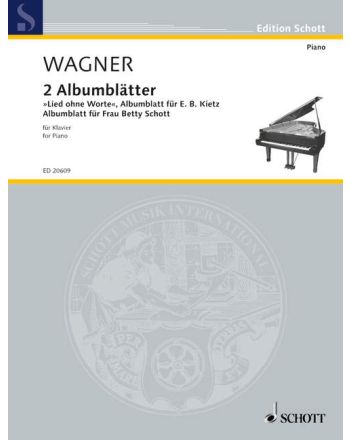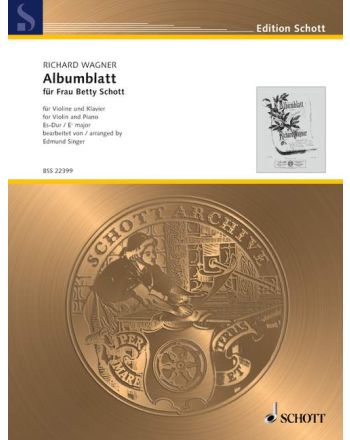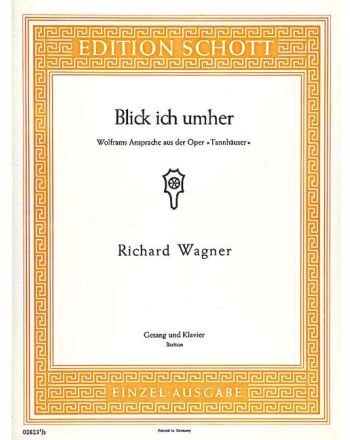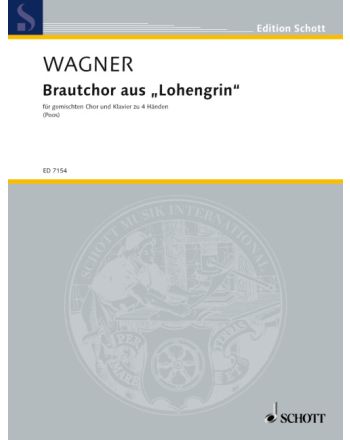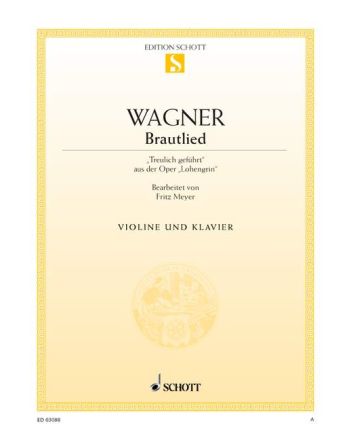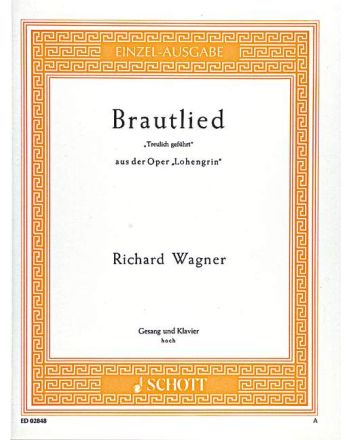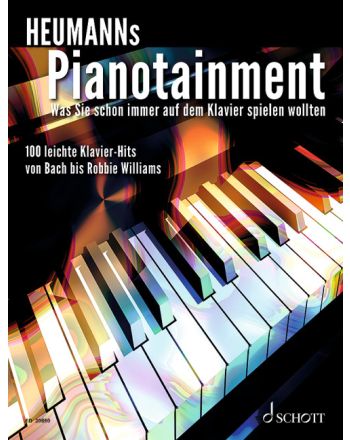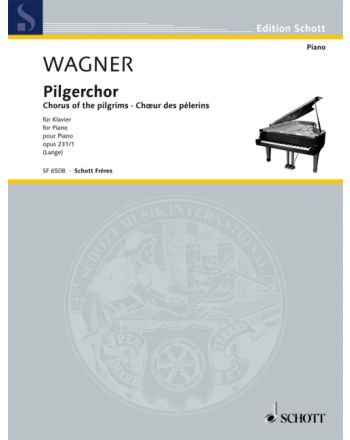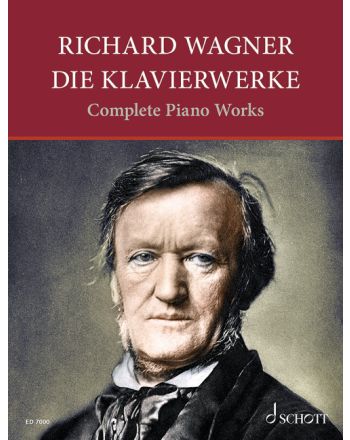
Richard Wagner
Country of origin:
Germany
Birthday:
May 22, 1813
Date of death:
February 13, 1883
Upcoming Performances
Lohengrin
Conductor: Fredrik Burstedt
Orchestra: Nordiska Kammarorkestern
February 28, 2026 |
Sundsvall (Sweden) , Tonhallen — National Premiere
The Ring
Conductor: Tarmo Peltokoski
Orchestra: London Symphony Orchestra
March 1, 2026 |
London (United Kingdom of Great Britain and Northern Ireland) , Barbican Hall
About Richard Wagner
The childhood of Richard Wagner (born on 22 May 1813) was divided between Dresden and Leipzig, where he had his first composition lessons in 1831/32 from Christian Theodor Weinlig, cantor at the Thomasschule. In 1833 he became chorus master at the Würzburg theatre. Later he held brief appointments as music director at theatres in Bad Lauchstädt, Magdeburg, and Königsberg, where he married the actress Minna Planer in 1836.
A conducting engagement took him to Riga in 1837, but in 1839 Wagner and Minna left Riga and his creditors under cover of night, heading for Paris over the stormy Baltic Sea. There he remained for three hard years, completing Rienzi (1840). His years in Paris turned into a bitterly disappointing experience. He eked out something less than a living by doing musical hack-work and writing articles. His first success with Rienzi in Dresden in 1842 led to his appointment as musical director (Hofkapellmeister) at Dresden in 1843, and shortly afterwards Der fliegende Holländer as well as his innovative Tannhäuser were performed for the first time. Some of his outstanding achievements were a performance of Beethoven’s Ninth Symphony and his revised version of Gluck’s Iphigenie in Aulis.
In May 1849, having taken part in the revolt in Saxony, Wagner had to flee abroad, and after failing to establish himself as opera composer in Paris he settled with his wife in Zurich in 1857. They lived in a house on the Wesendonck estate under the patronage of the financier Otto von Wesendonck. While in Zurich he published various theoretical writings and composed Das Rheingold, Die Walküre and two acts of the opera Siegfried. While working on the Ring cycle, Wagner had fallen in love with Mathilde Wesendonck, the wife of his wealthy patron. The Ring Cycle work was interrupted in 1857 and not continued until 12 years later. He shifted his interest to a new subject, the love tragedy Tristan und Isolde. In an untenable situation in 1858 he moved first to Venice, then to Lucerne, Paris and Vienna.
Although he was composing what would become some of the most famous pieces in music history, Wagner struggled financially until 1864, when Ludwig II of Bavaria called him to Munich and began supporting him. So, in 1865 Tristan und Isolde and in 1868 Die Meistersinger von Nürnberg were premiered in Munich. Already by 1866 Wagner had fallen into disfavour amongst members of the court, who were suspicious of his influence on the king. He left Munich and went to Tribschen (near Lucerne), where he married Cosima von Bülow in 1870, the daughter of his friend Franz Liszt, who always supported him humanly and artistically. Around that time Die Meistersinger was finished, and he worked steadily at the unfinished portion of Der Ring des Nibelungen and further evolved the intellectual framework for his towering mature masterpieces.
In 1872 Wagner, his wife and the three children Isolde, Eva and Siegfried settled in Bayreuth. Wagner was anxious to have a special Festival Theatre for the complete cycle and spent much energy trying to raise money for it. Finally, King Ludwig II provided the necessary support. In 1872 the cornerstone was laid on Bayreuth’s Green Hill and the opera house was built to his personal specifications and suited to the massive fusion of music, staging, text, and scene design that his later operas entailed. The first festival – an artistic triumph but a financial disaster – was held there in 1876, when the complete Ring was given conducted by Hans Richter. In 1882 the second Bayreuth Festival took place with sixteen performances of Parsifal under Hermann Levi, which were financially successful. After that, Wagner and his family who had already spent the winter in Italy for some years, went to Venice where he died on 13 February 1883 of the heart trouble that had been with him for some years.
Products
-
Arie für Bass, Männerchor und Orchester für die Oper „Norma“ von Vincenzo BelliniComposer: Richard WagnerEditor: Egon VossMedia Type: Hire/performance materialEdition: Performance materialLanguage: ItalianHire/performance materialHire/performance material
-
Album leaf for Ernst Benedikt Kiez: 'Lied ohne Worte' / Album leaf for Mrs Betty SchottProduct TypeIn stockAs low as €8.99Incl. Tax
-
The Flying Dutchman (Overture) / The Mastersingers (Prelude)Composer: Richard WagnerEditor: Egon VossMedia Type: Sheet music with CDEdition: Study scoreSeries: Eulenburg Audio+Score
Instrumentation: orchestraLanguage: German, EnglishProduct number: EAS 148Print edition + CDPrint edition + CDIn stock€17.00Incl. Tax, Excl. Shipping -
Tristan und Isolde - Lohengrin - TannhäuserComposer: Richard WagnerEditor: John Deathridge | Klaus Doege | Reinhard Strohm | Isolde Vetter | Egon VossMedia Type: Sheet music with CDEdition: Study scoreSeries: Eulenburg Audio+Score
Instrumentation: orchestraLanguage: German, EnglishProduct number: EAS 180Print edition + CDPrint edition + CDIn stock€15.50Incl. Tax, Excl. Shipping -
Composer: Richard WagnerEditor: Ernst PraetoriusMedia Type: Sheet musicEdition: Study scoreSeries: Eulenburg Miniature Scores
Instrumentation: orchestraProduct number: ETP 671Print editionPrint editionIn stock€10.00Incl. Tax, Excl. Shipping -
Fromental Halévy: "La Reine de Chypre"Composer: Richard WagnerEditor: Egon VossMedia Type: Sheet musicEdition: Score and critical report, complete editionSeries: Richard Wagner - Complete Works, Vol. 20/II C
Product number: RWA 120-22Print editionPrint editionIn stock€405.00Incl. Tax, Excl. Shipping -
Sonate in As-Dur für Klavier (WWV 85)Composer: Richard WagnerMedia Type: Hire/performance materialEdition: Performance materialInstrumentation: orchestraHire/performance materialHire/performance material
-
für Violine und Orchester eingerichtet von Edmund SingerHire/performance materialHire/performance material
-
für Frau Betty SchottComposer: Richard WagnerArranger: Edmund SingerSeries: Schott Archive
Instrumentation: violin and pianoProduct number: BSS 22399Product TypeIn stockAs low as €6.99Incl. Tax -
Composer: Richard WagnerMedia Type: E-score PDFInstrumentation: pianoProduct number: BSS 22134 Q20548E-score PDFE-score PDFIn stock€4.99Incl. Tax
-
Gebet der Elisabeth aus "Tannhäuser"Composer: Richard WagnerEditor: Johannes DoebberMedia Type: Sheet musicSeries: Operngesänge, 263
Instrumentation: soprano and pianoLanguage: GermanProduct number: RL35580Print editionPrint editionIn stock€7.00Incl. Tax, Excl. Shipping -
Gebet des Rienzi aus "Rienzi"Composer: Richard WagnerMedia Type: Sheet musicSeries: Operngesänge, 252
Instrumentation: tenor and pianoLanguage: GermanProduct number: RL35590Print editionPrint editionIn stock€7.00Incl. Tax, Excl. Shipping -
Gebet der Elisabeth aus der Oper "Tannhäuser"Composer: Richard WagnerArranger: Karl KlindworthSeries: Edition Schott - Single Edition
Instrumentation: soprano and pianoProduct number: ED0 2825Product TypeIn stockAs low as €3.99Incl. Tax -
Am 15. Dezember 1844Composer: Richard WagnerEdition: Choral scoreSeries: Schott Choral Music
Instrumentation: men's choir (TTBB) a cappellaProduct number: C 55506Product TypeIn stockAs low as €2.99Incl. Tax -
aus "Die Meistersinger von Nürnberg"Composer: Richard WagnerArranger: Heinrich PoosEdition: ScoreInstrumentation: mixed choir (SATB) with piano (4 hands)Product number: ED 7157Product TypeIn stockAs low as €17.99Incl. Tax
-
aus "Die Meistersinger von Nürnberg"Composer: Richard WagnerEditor: Cyrill KistlerEdition: Individual part, double bassSeries: Schott Choral Music
Instrumentation: mixed choir (SATB) or men's choir (TTBB/TB) and orchestraProduct number: C 24061-16Product TypeIn stockAs low as €3.99Incl. Tax -
aus "Die Meistersinger von Nürnberg"Composer: Richard WagnerEditor: Cyrill KistlerEdition: ScoreSeries: Schott Choral Music
Instrumentation: mixed choir (SATB) or men's choir (TTBB/TB) and orchestraProduct number: C 24061Product TypeIn stockAs low as €12.99Incl. Tax -
aus "Die Meistersinger von Nürnberg"Composer: Richard WagnerEditor: Cyrill KistlerMedia Type: E-score PDFEdition: Set of wind partsSeries: Schott Choral Music
Instrumentation: mixed choir (SATB) or men's choir (TTBB/TB) and orchestraLanguage: GermanProduct number: C 24061-11 Q38470E-score PDFE-score PDFIn stock€31.99Incl. Tax -
aus "Die Meistersinger von Nürnberg"Composer: Richard WagnerEditor: Cyrill KistlerMedia Type: E-score PDFEdition: Individual part, violin ISeries: Schott Choral Music
Instrumentation: mixed choir (SATB) or men's choir (TTBB/TB) and orchestraLanguage: GermanProduct number: C 24061-12 Q38469E-score PDFE-score PDFIn stock€3.99Incl. Tax -
aus "Die Meistersinger von Nürnberg"Composer: Richard WagnerEditor: Cyrill KistlerMedia Type: E-score PDFEdition: Individual part, violin IISeries: Schott Choral Music
Instrumentation: mixed choir (SATB) or men's choir (TTBB/TB) and orchestraLanguage: GermanProduct number: C 24061-13 Q38468E-score PDFE-score PDFIn stock€3.99Incl. Tax -
aus "Die Meistersinger von Nürnberg"Composer: Richard WagnerEditor: Cyrill KistlerMedia Type: E-score PDFEdition: Individual part, violaSeries: Schott Choral Music
Instrumentation: mixed choir (SATB) or men's choir (TTBB/TB) and orchestraLanguage: GermanProduct number: C 24061-14 Q38467E-score PDFE-score PDFIn stock€3.99Incl. Tax -
aus "Die Meistersinger von Nürnberg"Composer: Richard WagnerEditor: Cyrill KistlerMedia Type: E-score PDFEdition: Individual part, celloSeries: Schott Choral Music
Instrumentation: mixed choir (SATB) or men's choir (TTBB/TB) and orchestraLanguage: GermanProduct number: C 24061-15 Q38466E-score PDFE-score PDFIn stock€3.99Incl. Tax -
aus "Die Meistersinger von Nürnberg"Composer: Richard WagnerEditor: Cyrill KistlerMedia Type: E-score PDFEdition: Piano reductionSeries: Schott Choral Music
Instrumentation: Men's Choir (TTBB/TB) and OrchestraLanguage: GermanProduct number: C 26545 Q38292E-score PDFE-score PDFIn stock€3.99Incl. Tax -
aus "Die Meistersinger von Nürnberg"Composer: Richard WagnerEditor: Cyrill KistlerMedia Type: Sheet musicEdition: Piano reduction, (= choral score)Series: Schott Choral Music
Instrumentation: mixed choir (SATB) and orchestraLanguage: GermanProduct number: C 24061-10Print editionPrint editionIn stock€6.50Incl. Tax, Excl. Shipping -
aus der Oper „Tannhäuser”Composer: Richard WagnerMedia Type: Sheet musicInstrumentation: Alto and PianoLanguage: GermanProduct number: AF 6161Print editionPrint editionIn stock€10.95Incl. Tax, Excl. Shipping
-
with a documentation on Wagner's German translation of the libretto and his further analysis of the workComposer: Richard WagnerEditor: Christa JostMedia Type: Sheet musicEdition: Score and critical report, complete editionSeries: Richard Wagner - Complete Works, Vol. 20/IV
Bearbeitung von Glucks "Iphigenia in Aulis"/Konzertschluss zur Ouvertüre, Vol. 20/IV
Product number: RWA 120-40Print editionPrint editionIn stock€425.00Incl. Tax, Excl. Shipping -
Klavierauszug zu "Tannhäuser"Composer: Richard WagnerEditor: Egon VossMedia Type: Sheet musicEdition: Score and critical report, complete editionSeries: Richard Wagner - Complete Works, Vol. 20/III
Product number: RWA 120-30Print editionPrint editionIn stock€296.00Incl. Tax, Excl. Shipping -
Klavierauszug von L.v. Beethovens Symphonie Nr. 9 d-Moll op. 125 zu zwei HändenComposer: Richard WagnerEditor: Christa JostMedia Type: Sheet musicEdition: Score and critical report, complete editionSeries: Richard Wagner - Complete Works, Vol. 20/1
Product number: RWA 120-10Print editionPrint editionIn stock€118.00Incl. Tax, Excl. Shipping -
Composer: Richard WagnerEditor: Egon VossMedia Type: Sheet musicEdition: Score and critical reportSeries: Richard Wagner - Complete Works, Vol. 20/II A
Product number: RWA 120-20Print editionPrint editionIn stock€203.00Incl. Tax, Excl. Shipping -
Composer: Richard WagnerEditor: Egon VossMedia Type: Sheet musicEdition: Score and critical report, complete editionSeries: Richard Wagner - Complete Works, Vol. 20/II B
Product number: RWA 120-21Print editionPrint editionIn stock€290.50Incl. Tax, Excl. Shipping -
aus "Tannhäuser"Composer: Richard WagnerArranger: Karl Klindworth | Wilhelm LutzSeries: Edition Schott - Single Edition
Instrumentation: Baritone and PianoProduct number: ED0 2823Product TypeIn stockAs low as €3.99Incl. Tax -
"Treulich geführt ziehet dahin"Composer: Richard WagnerArranger: Heinrich PoosEdition: Choral scoreInstrumentation: mixed choir (SATB) and female choir (SMezA) with piano (4 hands)Product number: ED 7154-01Product TypeIn stockAs low as €2.99Incl. Tax
-
"Treulich geführt ziehet dahin"Composer: Richard WagnerArranger: Heinrich PoosEdition: Score, (= piano part)Series: Edition Schott
Instrumentation: mixed choir (SATB) and female choir (SMezA) with piano (4 hands)Product number: ED 7154Product TypeIn stockAs low as €11.99Incl. Tax -
"Treulich geführt" from the opera "Lohengrin"Composer: Richard WagnerArranger: Fritz MeyerSeries: Edition Schott - Single Edition
Instrumentation: violin and pianoProduct number: ED0 3088Product TypeIn stockAs low as €3.99Incl. Tax -
Treulich geführt from "Lohengrin"Composer: Richard WagnerArranger: Karl Klindworth | Wilhelm LutzSeries: Edition Schott - Single Edition
Instrumentation: high Voice and PianoProduct number: ED0 2848Product TypeIn stockAs low as €3.99Incl. Tax -
from: LohengrinComposer: Richard WagnerArranger: Hans-Guenter HeumannMedia Type: E-score PDFProduct number: ED 21129 Q47410E-score PDFE-score PDFIn stock€2.99Incl. Tax
-
(from "Lohengrin")Media Type: E-score PDFProduct number: ED 21698 Q23127E-score PDFE-score PDFIn stock€2.99Incl. Tax
-
from the opera "Lohengrin"Composer: Richard WagnerArranger: Hans-Guenter HeumannMedia Type: E-score PDFInstrumentation: pianoLanguage: German, EnglishProduct number: ED 20850 Q16733E-score PDFE-score PDFIn stock€2.99Incl. Tax
-
"Treulich geführt" from the opera "Lohengrin"Composer: Richard WagnerArranger: L. RitterMedia Type: E-score PDFSeries: Edition Schott - Single Edition
Instrumentation: harmonium (with Text)Product number: ED0 3024 Q15484E-score PDFE-score PDFIn stock€3.99Incl. Tax -
from the opera "Lohengrin"Composer: Richard WagnerArranger: Richard KleinmichelSeries: Edition Schott - Single Edition
Instrumentation: piano (with Text)Product number: ED0 2843Product TypeIn stockAs low as €3.99Incl. Tax -
Die Postkarten-Sammlung zum 100. TodestagMedia Type: MiscellaneousEdition: Postcards (10 Pieces)Product number: SKK 10MiscellaneousMiscellaneousIn stock€3.50Incl. Tax, Excl. Shipping
-
aus der Oper „Tannhäuser”Composer: Richard WagnerMedia Type: Sheet musicInstrumentation: high Voice and PianoProduct number: AF 6160Print editionPrint editionIn stock€7.95Incl. Tax, Excl. Shipping
-
"Beglückt darf nun dich, o Heimat, ich schauen" aus "Tannhäuser"Composer: Richard WagnerArranger: Heinrich PoosEdition: Choral scoreInstrumentation: men's choir (TTBB) and orchestra or piano (4 hands)Product number: ED 7155-01Product TypeIn stockAs low as €2.99Incl. Tax
-
"Beglückt darf nun dich, o Heimat, ich schauen" aus "Tannhäuser"Composer: Richard WagnerArranger: Heinrich PoosMedia Type: Sheet musicEdition: Score, (= piano part)Instrumentation: men's choir (TTBB) and piano (4 hands)Language: GermanProduct number: ED 7155Print editionPrint editionIn stock€19.50Incl. Tax, Excl. Shipping
-
"Summ und brumm, du gutes Rädchen"Composer: Richard WagnerArranger: Heinrich PoosEdition: Choral scoreInstrumentation: female choir (SSAA) with piano (4 hands)Product number: ED 7153-01Product TypeIn stockAs low as €2.99Incl. Tax
-
"Summ und brumm, du gutes Rädchen"Composer: Richard WagnerArranger: Heinrich PoosMedia Type: Sheet musicEdition: Score, (= piano part)Instrumentation: female choir (SSAA) with piano (4 hands)Language: GermanProduct number: ED 7153Print editionPrint editionIn stock€13.50Incl. Tax, Excl. Shipping
-
Composer: Richard WagnerEditor: Reinhard KappMedia Type: Sheet musicEdition: Score and critical report, complete editionSeries: Richard Wagner - Complete Works, Vol. 16
Product number: RWA 116Print editionPrint editionIn stock€348.00Incl. Tax, Excl. Shipping -
from the opera "Tannhäuser"Composer: Richard WagnerArranger: Gustav LangeSeries: Edition Schott
Instrumentation: pianoProduct number: SF 6508Product TypeIn stockAs low as €6.99Incl. Tax -
arranged by Rudi KöhlerMedia Type: Sheet musicEdition: Score and partsInstrumentation: 4 trombonesProduct number: EE 5411Print editionPrint editionIn stock€24.00Incl. Tax, Excl. Shipping
-
Composer: Richard WagnerProduct number: ED 7000Product TypeIn stockAs low as €21.99Incl. Tax
Performances
Lohengrin
Conductor: Fredrik Burstedt
Orchestra: Nordiska Kammarorkestern
February 28, 2026 |
Sundsvall (Sweden) , Tonhallen — National Premiere
The Ring
Conductor: Tarmo Peltokoski
Orchestra: London Symphony Orchestra
March 1, 2026 |
London (United Kingdom of Great Britain and Northern Ireland) , Barbican Hall
Die Walküre
Conductor: François-Xavier Roth
Orchestra: SWR Symphonieorchester
March 1, 2026 |
Stuttgart (Deutschland) , Kultur- und Kongresszentrum Liederhalle
daraus: 1. Auszug
Das Rheingold
Conductor: Robert Jindra
March 1, 2026 |
Praha (Tschechische Republik) , Národní divadlo
Tannhäuser (WWV 70)
Conductor: Alessandro Cedrone
Orchestra: Bursa Senfoni
March 5, 2026 |
Bursa (Turkey) , Atatürk Kültür Merkezi Merinos
Götterdämmerung
Conductor: Frank Beermann
Orchestra: Philharmonisches Orchester Kiel
7. März 2026 |
Kiel (Deutschland) , Opernhaus
Die Walküre
Conductor: Frank Beermann
Orchestra: Philharmonisches Orchester Kiel
7. März 2026 |
Kiel (Deutschland) , Opernhaus
Das Rheingold
Conductor: Frank Beermann
Orchestra: Philharmonisches Orchester Kiel
7. März 2026 |
Kiel (Deutschland) , Opernhaus
Siegfried
Conductor: Frank Beermann
Orchestra: Philharmonisches Orchester Kiel
7. März 2026 |
Kiel (Deutschland) , Opernhaus
Das Rheingold
Conductor: Robert Jindra
March 7, 2026 |
Praha (Tschechische Republik) , Národní divadlo
Götterdämmerung
Conductor: Frank Beermann
Orchestra: Philharmonisches Orchester Kiel
15. März 2026 |
Kiel (Deutschland) , Opernhaus
Die Walküre
Conductor: Frank Beermann
Orchestra: Philharmonisches Orchester Kiel
15. März 2026 |
Kiel (Deutschland) , Opernhaus
Das Rheingold
Conductor: Frank Beermann
Orchestra: Philharmonisches Orchester Kiel
15. März 2026 |
Kiel (Deutschland) , Opernhaus
Siegfried
Conductor: Frank Beermann
Orchestra: Philharmonisches Orchester Kiel
15. März 2026 |
Kiel (Deutschland) , Opernhaus
Siegfried
Conductor: Antonio Pappano
Orchestra: Orchestra of the Royal Opera House
March 17, 2026 |
London (United Kingdom of Great Britain and Northern Ireland) , Royal Opera House — First Night
Siegfried
Conductor: Antonio Pappano
March 17, 2026 |
London (United Kingdom of Great Britain and Northern Ireland) , Royal Opera House — First Night
Sinfonie in C-Dur
Conductor: An Hoon Song
Orchestra: Daejeon Philharmonic Orchestra
March 20, 2026 |
Daejeon City (South Korea) , Art Center
Parsifal
Conductor: Roland Fister
Orchestra: Philharmonie Baden-Baden
March 20, 2026 |
Dornach (Switzerland) , Goetheanum
Parsifal Suite
Conductor: Pierre Bleuse
Orchestra: Filarmonica Banatul Timișoara
March 20, 2026 |
Timișoara (Romania) , Filarmoni, Sala Capitol — National Premiere
Parsifal Suite
Conductor: Andrew Gourlay
Orchestra: Orquesta Sinfónica do Porto Casa da Musica
March 20, 2026 |
Porto (Portugal) , Casa da Música


